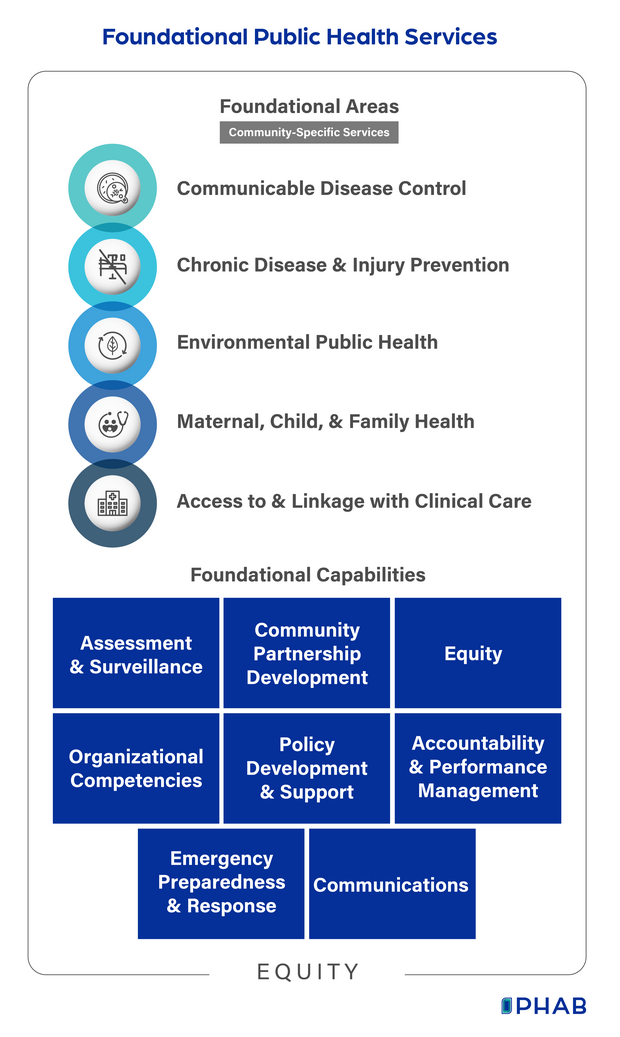About the Foundational Public Health Services (FPHS)
As part of the State Action for Public Health Excellence (SAPHE) Program, the Department of Public Health’s (DPH) Office of Local and Regional Health (OLRH) is adopting the FPHS framework for Massachusetts’ local public health system.
In 2019, the Blueprint for Public Health Excellence showed that the National FPHS framework can improve public health standards in Massachusetts. Local health boards across the state implementing the FPHS will lead to equitable delivery of public health services.
The current Performance Standards for Local Public Health are based on Massachusetts laws and regulations. The FPHS go a step further and describe core elements of public health services that should be provided to a community (e.g., Communications and Policy Development & Support). The next version of the Performance Standards will include the FPHS Framework. OLRH continues to actively engage local public health in developing guidance to aid local public health in adopting the FPHS Framework. Outcomes from this engagement process will support the next version of the Performance Standards, providing supplemental guidance that includes Massachusetts examples and descriptions of the FPHS.
A national Framework tailored for every municipality
The FPHS Framework sets a minimum level of services that should be available in every community but lets each community choose how to provide those services. Local public health departments are responsible for making sure these services are available either directly or through other groups. This approach allows local public health to work with other community groups to address local issues and changing needs.
The FPHS Framework
The FPHS Framework comprises two main components:
- Foundational Areas
- Foundational Capabilities
Foundational Area
Foundational Areas are the key health programs and activities that every community should have. These Areas focus on performing the basic prevention, promotion, and protection activities that keep communities healthy.
These Foundational Areas include:
- Communicable Disease Control
- Chronic Disease & Injury Prevention
- Environmental Public Health
- Maternal, Child, & Family Health
- Access to & Linkage with Clinical Care
Foundational Capabilities
The Foundational Capabilities are the essential skills and functions needed to support basic public health protections, programs, and activities. Working together, all of these important functions build a solid infrastructure to support the programs and activities that will achieve equitable health outcomes.
The Foundational Capabilities are:
- Assessment & Surveillance
- Community Partnership Development
- Equity
- Organizational Competencies
- Policy Development & Support
- Accountability & Performance Management
- Emergency Preparedness & Response
- Communications
Equity
Incorporating equity throughout the Framework is essential. To do so, public health must commit to and invest resources in uplifting groups historically and currently affected by disparities and exclusion, across all foundational capabilities and areas. Achieving this requires addressing internal and external structural, systemic, and social barriers that maintain inequities.
FPHS resources
Check out the additional FPHS education materials below.
PHAB FPHS learning module
This learning module provides an interactive opportunity to explore the history and evolution of FPHS, the role of equity in this framework, and the technical components of the framework (Foundational Areas and Capabilities).
FPHS Factsheet
The FPHS Factsheet (PDF) (DOCX) contains high-level definitions of the public health infrastructure and programs required for health departments to provide basic protections to the communities they serve.
FPHS operational definitions
FPHS operational definitions (PDF) (DOCX) outlines operational definitions for all 13 Foundational Areas and Capabilities, breaking them down into headline responsibilities and discrete FPHS activities.
Newsletter Archive
All information related to engagement of local public health and content shared in the FPHS Newsletter is documented in the newsletter archive. This serves as a repository for communications with LPH.
